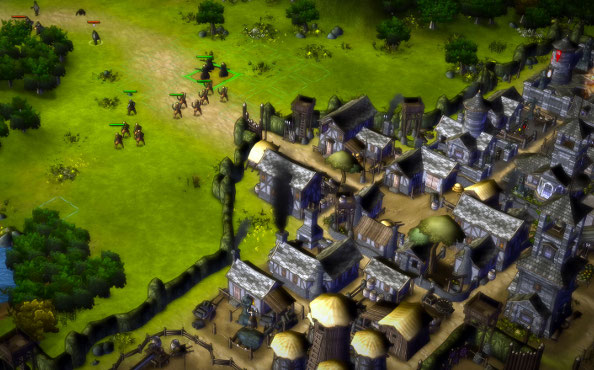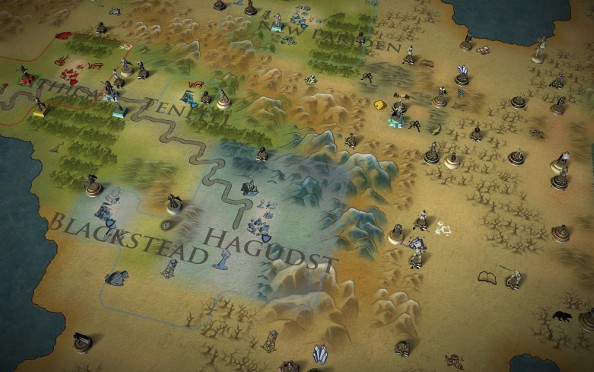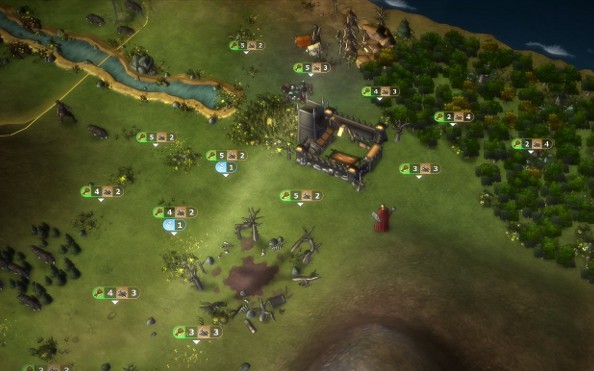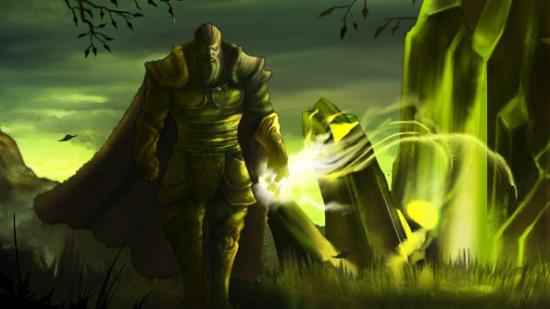Derek Paxton is Stardock’s Mr. Wolf. He joined Stardock after making the hit Civilization IV mod, Fall From Heaven, a which took the Civilization IV design and used it to create an enormous fantasy-themed playground where pirates, dwarves, and vampires struggled for control of the world. His experience and imagination made him a perfect fit for a tough job: putting the Elemental series back on track by uncovering potential greatness buried beneath the ruin of War of Magic.
But first he needed to understand how things went so wrong.
“I went through everything to find the direction,” Paxtonsaid. “I read many revisions of the concept and design documents for War of Magic. I interviewed everyone on the team to find out what they liked about the game.”
Paxton blames War of Magic’s problems on a badly managed production, but one that is understandable to those who know Stardock. Stardock brought its experiences from the successful Galactic Civilizations franchise to War of Magic, and thought that War of Magic would be a similar type of project. But while Stardock knows how to make a space grand-strategy game, to the point where most departments can just develop content and integrate their new ideas into the established design, War of Magic was something entirely different. It was a new idea, bigger than anything Stardock had done before.
“It went wrong because there wasn’t a clear direction and there wasn’t a dedicated designer and producer,” Paxton explained. “The people filling those roles wore so many other hats that design and production responsibilities didn’t get the time and focus they deserved. So they hired me to help with that.”
Two games, one design
In the end, Paxton created two design documents to guide the development of the next two Elemental games. The first would flesh out the world more, focusing on the monsters, champions, magic, and warfare in the world of Elemental. The next game would substantially revise the empires themselves, and how players managed them. In a word, the first game would address the fantasy RPG aspects of Elemental, and the second would deepen the strategy.
With the designs finished, Paxton rushed through development and implementation of the first game. He wanted to see a feature-complete, playable build as soon as possible. It wasn’t pretty, but Stardock was able to send it out to playtesters and get a sense for whether they were on the right track.
“The feedback was unanimous. The game was better, the players like the new features, but the game still ‘felt like WoM’. That is the death blow. If I was a drinking man, I would have been drinking.
“I scrambled looking for fixes and considered a bunch of changes that could be implemented easily,” Paxton said. “But in the end I didn’t see any way to fix it without implementing the changes we had planned for the second game.”

He went to Wardell and told him that their original plan had to be scuttled, and they’d have to make one big game, with an attendant increase in budget and time.
“This was a hard decision because we were giving the game away for free to so many people,” he said. “It’s always hard to extend the schedule, it’s a big financial risk, but when the game will likely lose money regardless of the time and money invested, it’s even more difficult to invest more money in it.”
It was also a hard decision for Paxton personally, because he felt like the mistake was his. He’d failed to deliver a fun game with his first design, and now he needed to ask for more time and more money to fix it, as well as use up their ideas for a second game. Wardell, however, was fine with the situation and readily approved the new production on the combined design that would become Fallen Enchantress.
“One of the things that helped with this was the sales of Galactic Civilizations on Steam,” Paxton said. “We sold more copies of Gal Civ on the day it went for sale on the steam sale then on the day it was released. It was a good lesson for us, if you make a great game it will continue to pay dividends. If you rush something out half-baked, it’s lost forever.”
A fixedgame and a broken world
One problem with War of Magic was that despite having a novel’s worth of backstory, it never really delivered on its theme. For a hostile world recovering from a series of magical and political disaster, it was a surprisingly placid place to go about setting up shop. Paxton wanted to fix that, and to steep players in the wasteland.
“I wanted the broken theme to come through whenever possible,” he said. “I designed the new monsters in Fallen Enchantress. The Scrap Golem, a golem that has fought many wars and is barely hanging together. The Plaguestalker, a panther that is overcome by disease. Vetrar, an elemental lord with a withered arm, and the sword that caused it still stuck in his shoulder.”

Still, Paxton admits that Fallen Enchantress’s emphasis on player customization placed some limitations on how much he could differentiate the factions and units from one another. It’s a far cry from what he was able to do on Fall from Heaven, a mod that has 17 years’ worth of backstory baked into it.
“One of the factions players enjoy the most in Fall from Heaven is the Calabim, cruel aristocratic vampires that rule over a peasant class that is little more than cattle for them,” he said. “The Calabim are fairly standard from a faction differentiation perspective except they have one special unit, the Vampire, that they get in the midgame.The vampire has 3 special abilities. It can consume population in your cities to gain experience, it can consume an allied unit to heal itself and gain the ability to attack again, and it can pass its vampirism to an allied unit that was at least 6th level. These are good mechanics, it forces the player to think of his city population as a new thing, as a resource that can be consumed, and gets across the feeling of being a vampiric king of your empire.”
That’s the payoff for specificity, of being able to lock a unit and a set of mechanics to a single faction with a single identity. But even without that, Fallen Enchantress has something similar: Magnar, an empire of slavelords. “When Magnar defeats human or fallen units in battle, they are enslaved and added as population to the closest Magnar city. Magnar can train slave units that they don’t have to pay wages to and don’t have any training costs (though you still need to pay for any armor, weapon or equipment you give them). When Magnar razes cities, the population of that city is enslaved and added to Magnar’s capital.”
It opens up a lot of different possibilities for Magnar players, who can treat their units as disposable cannon fodder, and farm enemy armies to grow their cities. But while all these mechanics give Magnar a distinct identity, they’re also modular, and can be used in player-designed custom factions.
“Because those pieces can be broken into pieces, and many players choose to fit them together in different ways,” Paxton admitted, “there’s [isn’t as] strong of an emotional tie to the game mechanics and who Magnar is.
“It’s harder to get across an emotional feel, or to get a faction to resonate with a player when they see the mechanics for what they are: Lego pieces.”
Channeling the magic
Other elements of War of Magic did not survive Paxton’s scrutiny. “Going into it my concerns were in finding the core game and cutting away the pieces that didn’t fit that design without losing what made the Elemental series unique. I ended up cutting dynasties and naval combat from the game.”
He continued, “Dynasties were particularly hard because I felt that they were so unique and special to Elemental, but I couldn’t find a game need for them, so they went. I considered cutting tactical battles and quests to, but they were critical to the experience so they were left in and significantly altered.”
The biggest change Paxton may have made, however, was to the role of magic. War of Magic was chock-full of magic, so much so that it became almost inconsequential. It used a Heroes of Might & Magic-style approach to the spellbook, where players unlocked new spells and every casting hero could use them. So everyone had a fire spell, a water spell, and a lightning spell. Casters were walking arcane Wikipedias. Paxton felt that needed to change.
“I wanted particular champions to matter,” he said. “ I wanted sovereigns to not have access to everything, to have a champion that could do things that your sovereign couldn’t. I wanted it to mean something when you saw a champion in the wild that was proficient in Earth magic, or Fire magic. It also forced some choices at level-up where players had to pick between making the unit better in combat, making them less frail or getting them access to new spells. I wanted it to be special that a particular champion could cast Heal, while another could summon Earth Elementals.”
It’s wrought a profound change to how Fallen Enchantress works, and one that typifies what Paxton accomplished. Champions matter now in a way they didn’t before: having more heroes in your roster changes how you can approach world exploration and warfare, while having fewer requires a greater emphasis on regular army units and buffing the few you do have. A caster adept in multiple forms of magic is now a huge asset, because most of them tend to be specialists. In a word, he made the RPG elements matter, in a way they never did in War of Magic.
On the other hand, a 4X-RPG can pose some balance problems, especially when it gives players so much variety over what kind of fantasy world they’ll inhabit. It’s up to the player how much the world is a shattered wasteland, and how many dangerous monsters roam it. They get to decide whether the world is filled with champions, and quests. It poses extra challenges for the game balance, but Paxton isn’t so sure it’s something Stardock need to worry about.
“One of the nice things about being a single player game is that we don’t need it to be super balanced. Games can be easier or harder based on more than just the difficulty slider. There can be advantages to different builds, but that’s up to the player to control their experience. They can do crazy things with their game, but it’s their game, so they are welcome to tweak all the knobs and see what happens.”
That said, Paxton hasn’t left everything to chance and the tender mercies of the roving dragons and bandit armies that dot the landscape.
“We have a lot of backend code to protect against bad situations (for example, you will never start a tile away from a dragon). But that doesn’t mean that there isn’t risk. Controlling monster placement is a big part, controlling what loot is offered is another. But inside those bounds there is a lot of room to explore and I hope players get to play a lot of games discovering that.”
Players who do will find themselves rewarded. Paxton has succeeded in crafting a worthy new strategy game that is at once distinct from the troubled War of Magic, and yet also entirely consistent with its original vision. It’s almost like magic.
Fallen Enchantress went on sale last week, and is available for free or at a discount for owners of the original War of Magic. You can hear more from Paxton on this week’s Three Moves Ahead, as well as the panel’s thoughts on how well Fallen Enchantress stands up to scrutiny.
